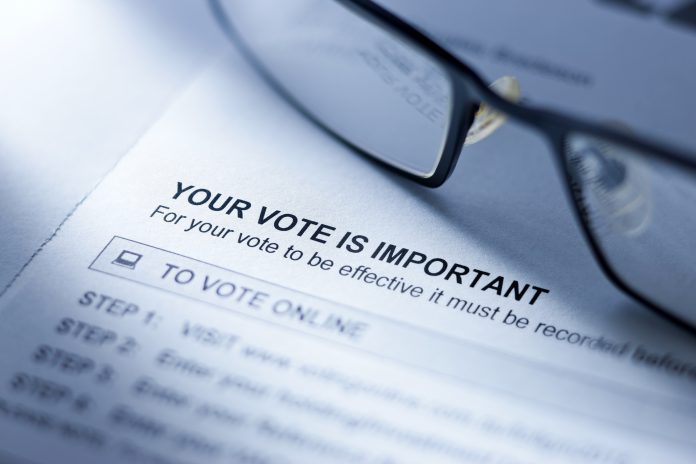Dr Mark Brookes MBE, Advocacy Lead at Dimensions UK, discusses the implications of the Elections Bill and measures to introduce voter ID on voter participation for people with a learning disability
As part of the government’s proposed Elections Bill, new laws would require voters to show photo ID at polling stations. Worryingly, this new requirement has the potential to exclude the 1.3 million adults in the UK with a learning disability, myself included, from our basic democratic right to vote.
Dimension’s Love Your Vote campaign promotes the voting rights of people with learning disabilities and/or autism as it aims to make elections more accessible. But insisting that people present ID when voting ignores the experience of people with a learning disability and, rather than empowering people, adds further barriers when taking part in voting.
Creating more barriers
Having voted for the past 10 to 15 years, it has started to feel so normal that I almost take it for granted. Voting is an incredibly empowering experience, but Dimensions’ research suggests that 27% of people currently aren’t aware that all people with a learning disability have this fundamental legal right.(1)
While the Elections Bill does make some effort to address accessibility issues – including measures to remove restrictions on who can act as a ‘companion’ to support voters at the polling station – the proposed requirement for photo ID could add to the barriers already faced by many people with a learning disability during both local and national elections.
Everyone is entitled to reasonable adjustments when voting, but people with a learning disability are far less likely to own photo ID and even obtaining alternative options that would be accepted under the Elections Bill, such as a Blue Badge, can be difficult. At Dimensions, a small sample of people we supports suggests that between 20%-50% may not currently have suitable ID to meet requirements set out in the Elections Bill.
The Elections Bill does attempt to take into consideration these difficulties with the implementation of a free Voter Card for those without photo ID. However, this still presents a very real obstacle and, in a survey conducted for the Cabinet Office, 56% of participants said that they were unlikely or very unlikely to apply for such a card.(2)
In fact, it is not just the difficulty of obtaining ID which will undermine efforts to improve accessibility, but also the added stress of having to bring it to the polling station. As someone who lives independently, I know that not every person with a learning disability will have a support worker or someone who can help them with this process – and that could leave people feeling unable to go out and exercise their right to vote.
Rather than making voting an empowering and accessible experience, there is a real risk that people with a learning disability – and especially those who live independently – could be left angry, frustrated and disenfranchised by these changes.
Addressing the wrong issues
Volunteering as an observer at my local polling station during the local elections in May, I personally witnessed many people with additional needs exercising their democratic right and have seen first-hand how proud people feel when making themselves heard in the polling booth. It would be disheartening to see the Elections Bill passed and two steps taken back from recent progress that has been made to improve accessibility.
Rather than focussing on voter ID, resources could be far better spent on making elections more accessible and empowering. In fact, in research completed by Dimensions ahead of the local elections this year as part of our Love Your Vote campaign, 80% of people reported that polling stations are difficult to use for people with a learning disability and 76% said they struggled to find easy-read manifestoes.(3)
Furthermore, as an observer, I saw an effective system in place already. Voters were required to give their names and addresses at the polling station and, in reality, the UK has very low levels of proven election fraud. According to the Electoral Commission, in 2019 there were just four convictions and two police cautions given for such instances.(4) With these facts in mind, the proposed changes seem to be seeking to address an issue that simply does not exist.
Threatening democratic rights
Ultimately, the proposed implementation of photo ID at polling stations through the Elections Bill does not safeguard our democracy. Instead, it seeks to fix an issue that does not exist and, in doing so, puts at risk the democratic rights of more than a million adults in the UK.
According to Dimension’s survey, a shocking 82% of people with learning disabilities already feel the government does not listen to their views as much as they listen to those of others. With these changes, I worry it will only be harder to make our voices heard, transforming the voting experience into something stressful and inaccessible and reversing the progress that has been made over recent years.
References





![Europe’s housing crisis: A fundamental social right under pressure Run-down appartment building in southeast Europe set before a moody evening sky. High dynamic range photo. Please see my related collections... [url=search/lightbox/7431206][img]http://i161.photobucket.com/albums/t218/dave9296/Lightbox_Vetta.jpg[/img][/url]](https://www.openaccessgovernment.org/wp-content/uploads/2025/04/iStock-108309610-218x150.jpg)





